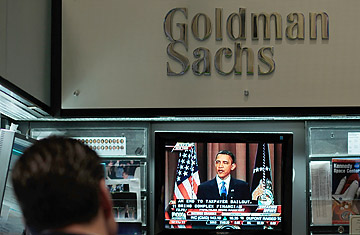
(2 of 2)
Again, I'm not saying the bills are bad; they'll help regulators protect consumers from scams, monitor systemic risks to financial markets and liquidate failing behemoths without bailouts or chaos. I'm saying that opposing these reforms is not necessarily a formula for populist backlash; there's plenty of room for opponents to claim they're the true tough-on-Wall Street populists. Just last week, Democratic Senator Byron Dorgan denounced the reforms as woefully inadequate because they don't break up big banks or ban naked credit-default swaps. To me, banning swaps to end financial misbehavior feels like banning video poker to try to end gambling addiction. But when a prairie populist like Dorgan says the reforms are a sham, and threatens his own filibuster, why should Republicans or more finance-friendly Democrats be afraid of blocking them?
• It Doesn't Rein In the Fed! This is a corollary to "It Doesn't Go Far Enough!" because the Federal Reserve is the ultimate target of populist fury. Left-wingers want the Fed to expand the money supply to fight unemployment, and right-wingers want the Fed to contract the money supply to fight inflation, but Fed bashers on both sides are sure there's something nefarious going on inside that marble fortress, as I discovered after I canonized their Satan. The Senate did vote to force the Fed to disclose who got all that cash it sprayed into the economy during the crisis, but it rejected the House plan for more intrusive audits in the future, reigniting the fury of the Fed haters. And both reform bills could expand the overall power of the Fed, a perfect talking point for conservatives looking for excuses to say nay. On the flip side, the Administration has suggested that the House plan to let congressional investigators audit the Fed's monetary-policy decisions could invite a veto — yet another potential sticking point.
• It Doesn't Fix Fannie and Freddie! Fannie Mae and Freddie Mac didn't cause the crisis, and Democrats say they intend to address them in a separate bill, and it's not like the Republicans whining about them ever did much to fix them. But they're a costly mess, and these bills do ignore them. It's a reasonable critique.
• It's Got Just One Problem ... In a bill this complex, with this many moving parts, the litany of potential deal killers is virtually endless. If only the bill hadn't included that loophole for industrial loan corporations or payday lenders or auto dealers. (Or if only it had!) If only it had restored Glass-Steagall or gutted proprietary trading. If only it hadn't pre-empted state consumer regulations or mandated haircuts for secured creditors. Otherwise, we would have been proud to support it! Reasonable people can disagree which end users should be exempted from derivatives clearinghouses, but surely we can all agree the issue would make a lousy attack ad.
• It's a Bailout Bill! Of course, it isn't. The status quo is a bailout status quo; the bill would avoid bailouts. But who cares? In the current climate, the truth seems irrelevant. And this is the main reason I'm skeptical of my sources; they're assuming a rational, well-informed political culture. In the end, Democrats are going to accuse Republicans of carrying Wall Street's water no matter how they vote. Republicans are going to fulminate about the Obama bailouts regardless of the reality on the ground. When the facts don't really matter, politicians can cast whatever votes they want — and then say whatever they want to defend themselves.
So yes, it's possible that some nervous Republican Senators will vote yes, and that the House and Senate will somehow agree to merge their bills and that the House and Senate will both pass the result into law. If so, I'll owe some well-placed sources some well-earned beers. But there is only one treacherous path to success. There are countless paths to such-a-shame-let's-try-again-next-year.
